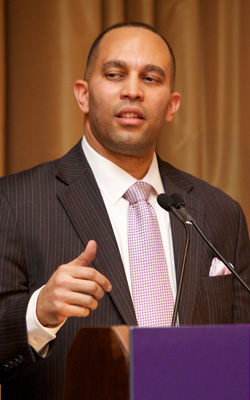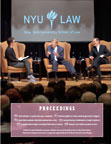A Man of the House
US Representative Hakeem Jeffries ’97 talks about his hopes as a new member of a divided Congress.
Printer Friendly Version In the increasingly stark left-right divide in the United States today, said Hakeem Jeffries ’97 at NYU Law’s Annual Alumni Luncheon in January, “‘compromise,’ among many, seems to be a dirty word.” Lamenting that attitude, he argued that meeting in the middle on everything from the Constitution and the makeup of Congress to the troubled institution of slavery and the matter of selecting presidents has characterized the country from its founding: “Compromise is uniquely American. Compromise gave birth to this great union.”
In the increasingly stark left-right divide in the United States today, said Hakeem Jeffries ’97 at NYU Law’s Annual Alumni Luncheon in January, “‘compromise,’ among many, seems to be a dirty word.” Lamenting that attitude, he argued that meeting in the middle on everything from the Constitution and the makeup of Congress to the troubled institution of slavery and the matter of selecting presidents has characterized the country from its founding: “Compromise is uniquely American. Compromise gave birth to this great union.”
Just two days before a local swearing-in ceremony to celebrate his resounding win in New York’s recently redrawn Eighth Congressional District, Jeffries delivered the alumni luncheon’s keynote speech to a crowd of more than 300.
In that speech and in his inaugural address, Jeffries addressed the challenges of finding common ground in a multicultural democracy. He observed at the luncheon that although the issues have changed—he rattled off the current problems of the stagnating economy, a difficult immigration policy, and gun violence—the need for compromise, he said, has not.
The congressman reinforced this point by observing how the Republican-Democrat pendulum has swung back and forth every two years in recent elections. With no party achieving consistent primacy, working across ideological divides is more important than ever. “In politics,” Jeffries said, “it’s often been said that there are no permanent friends, there are no permanent enemies. All there should be are permanent interests. I believe that we as members of Congress have a sacred charge to make sure we advance the permanent interests of the people of the United States of America.”
He has been appointed to the Judiciary and Budget committees as well as a bipartisan House Judiciary Committee task force on over-criminalization. During the 113th Congress, Jeffries has stated, he will work on economic growth, reforming the criminal justice system, preventing gun violence, and assisting neighborhoods in his district—which is anchored in Brooklyn and parts of southwest Queens—that were devastated by Superstorm Sandy.
Jeffries, who spent six years in the New York State Assembly before running for Congress, was born in Brooklyn and raised in Crown Heights. He attended New York City public schools and earned a bachelor’s degree in political science from the State University of New York at Binghamton, as well as a master’s in public policy from Georgetown and a JD from NYU Law, where he graduated magna cum laude and served on the Law Review.
After law school, Jeffries clerked for Judge Harold Baer Jr. of the US District Court for the Southern District of New York. Before being elected to the assembly, he practiced law for several years at Paul, Weiss, Rifkind, Wharton & Garrison and served as counsel in the litigation departments of Viacom and CBS.
Jeffries’s prepared remarks at the luncheon were polished, and his response to a question from the alumni audience regarding his position on gun control showed glimmers of a passionate public servant and representative. Jeffries replied that he recently asked for a meeting with the director of the Bureau of Alcohol, Tobacco, Firearms, and Explosives (ATF) after a string of fatal shootings occurred in his district. “In New York City, in Brooklyn, in the district that I represent, I don’t see any gun manufacturers,” he said. “Every single gun that comes into the Eighth Congressional District, it seems to me, is a gun that’s flowing in from the Deep South, up the I-95 corridor, and is being illegally trafficked in. I thought it was relevant to figure out what the ATF is doing, because if the ATF is not in Bedford-Stuyvesant, East New York, the South Bronx, Harlem, I’m not sure where they are.”
His passion was also evident at his local swearing-in, surrounded by family, friends, neighbors, and some of New York’s political power players. He dared to be funny about bringing his Brooklyn culture to a more buttoned-up Washington, DC. He noted that he represents much of the district served by the legendary seven-term Congresswoman Shirley Chisholm. Assuring the crowd that he’ll do his best, he said he imagines her voice in his head, saying, “Young man, we sent you down to Washington to stand up, so don’t go down there and act up.” And in a nod to his extraordinarily diverse constituency, he said he was grateful to receive Jewish, Muslim, and Christian prayers—“I am exponentially blessed!” he quipped—adding, “I’m down there with John Boehner and Paul Ryan, I need all the blessings I can get.”
—
